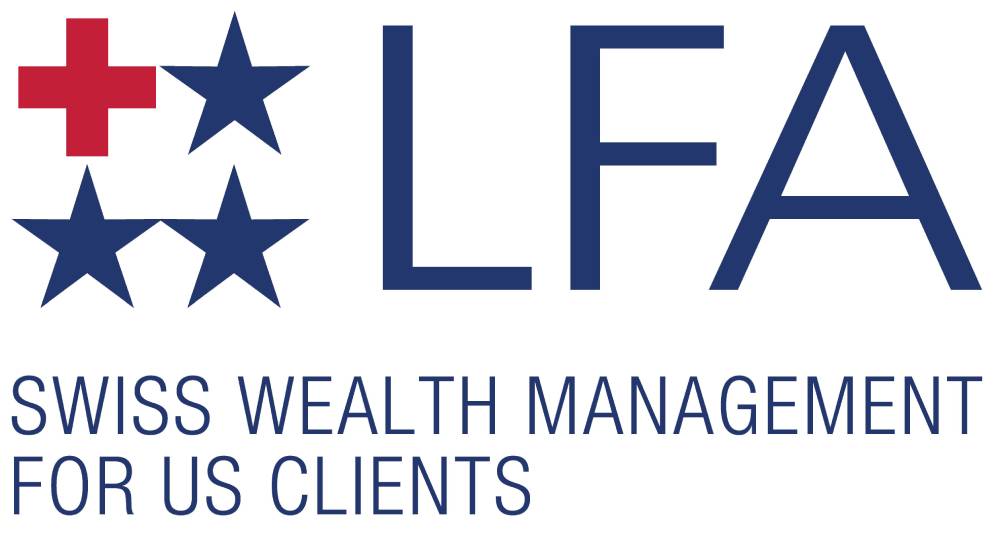As a U.S.-based investor with $1 million or more in investable assets, you may ask: How do I diversify beyond the typical mix of stocks, bonds, and real estate?
One strategy that has quietly endured for hundreds of years is investing in Switzerland. Known for its long-standing banking tradition, political stability, and neutral stances in global affairs, Switzerland offers unique opportunities for portfolio diversification, particularly if you’re concerned about currency risk, national debt, global financial volatility, and preserving the purchasing power of your assets.
In our blog, we’ll examine why Switzerland remains a preferred destination for sophisticated wealth management and how it can fit into a broader investment strategy without adding unnecessary complexity.
At LFA, our Swiss wealth advisors are licensed to work with American investors who want to build a more global wealth management strategy.
Hedging Your Portfolio Against the U.S. Dollar
As a U.S.-based investor with significant assets, allocating a portion of your wealth to Swiss francs (CHF) can be a practical hedge against over-exposure to the U.S. dollar.
The Swiss franc is one of the most stable currencies in the world. It is backed by Switzerland’s independent central bank, low inflation, and political neutrality.
In contrast, while dominant globally, the U.S. dollar is increasingly impacted by national debt levels, inflationary policies, tariffs, and shifting global geopolitical dynamics. If the dollar weakens, the purchasing power of your U.S.-based portfolio could decline, not just abroad, but at home through imported goods, commodities, and services.
Investing part of your portfolio in Swiss francs may help preserve value in an alternative currency system, giving you more flexibility and resilience. It’s not about timing the currency markets but strategic allocation and diversification.
Holding Swiss franc-denominated assets in investment accounts may reduce dependence on the U.S. dollar and spread risk across multiple economies.
If you have $1 million or more in investable assets, this currency diversification adds another layer of planning beyond traditional asset allocation. It’s a way to think globally while staying aligned with the pursuit of your long-term financial goals.
Swiss bank accounts for U.S. citizens can be opened transparently and legally, as long as they are properly declared and comply with applicable regulations. They can form part of a broader strategy to protect and grow wealth globally.
Why Switzerland Versus Other International Options?
While there are other global financial centers like Singapore and London, Switzerland offers several strategic advantages:
- Neutral political stance: Switzerland has maintained neutrality for centuries, helping insulate it from many geopolitical shocks.
- Independent currency: Unlike the euro-based countries, Switzerland has complete control over its monetary policy.
- Swiss financial institutions have no ties to politically unstable regimes or highly politicized entities. The Swiss generally avoid high-risk markets that could pose liquidity, currency, and other financial risks.
- Financial tradition: Swiss asset managers are known for multigenerational client relationships and an institutional culture focused on client service rather than product-driven sales.
These factors may appeal to U.S. investors who prefer not to move everything overseas but who recognize the potential risks of concentrating their financial exposure in a single jurisdiction.
How to Diversify Wealth Through Switzerland
The following are several options you can take to diversify a portion of your wealth into Swiss-based investments:
- Multi-currency accounts: Maintain cash reserves in different currencies to hedge against currency depreciation or economic downturns in particular countries.
- Swiss-domiciled funds: Gain access to European equities, emerging markets, or Swiss-based companies through securities that may not be listed on U.S. exchanges.
- Precious metals custody: Store gold or other metals in Swiss vaults under a separate custody agreement, not commingled with bank assets.
- Private investment opportunities: Certain Swiss institutions offer access to private equity or real estate investment opportunities unavailable in the U.S.
Each alternative serves a different purpose: mitigating risk, accessing additional growth opportunities, or simply holding part of your portfolio outside one country’s economic and currency systems.
Hypothetical Example #1: Sarah, a Retired Business Owner
Sarah, age 62, recently sold her graphics design business in Michigan and is sitting on roughly $4.5 million in after-tax investable assets. She’s already maxed out domestic tax-advantaged accounts, has a well-structured U.S. portfolio, and wants to diversify her wealth further while reducing her exposure to the U.S. dollar, economy, and government regulations.
By opening a Swiss bank account through a registered wealth management firm like LFA, Sarah moves 15% of her assets into a Swiss-based portfolio denominated in Swiss francs. Her goal isn’t to chase higher returns. Instead, it’s to preserve a portion of her wealth in a different currency, in a politically stable environment, and have options to invest across additional markets and asset classes.
She worked with a Swiss financial advisor who understands both the U.S. and Swiss regulatory systems and will coordinate with her U.S.-based CPA to handle any reporting requirements.
Hypothetical Example #2: Mark and Julia, Dual-Career Professionals
Mark and Julia are in their early 50s and live in New York. They’ve built a $3.2 million investment portfolio through a mix of company stock, IRAs, and taxable accounts. They’re not looking to retire early but are considering having that option if it suits their purpose. They want to explore other options with concerns about the concentration risk in their current strategy.
After consulting with LFA, a Swiss-based wealth advisor, they allocated 10% of their portfolio to Switzerland. Their Swiss-based account includes an international ESG fund, Swiss bonds, and a diversified equity strategy across European markets.
Their goal: to spread their investment risk across multiple currencies, economies, and financial systems without taking on more risk.
What You Need to Know Before Investing in Switzerland
Before opening a Swiss bank account or transferring assets abroad, it’s important to understand what’s involved:
- FATCA compliance: U.S. citizens must report foreign accounts to the IRS. Any reputable Swiss institution will provide documentation and guidance on meeting IRS requirements.
- Minimum account requirements: Many private Swiss banks have minimum asset requirements of $500,000 to $1 million.
- Coordination with U.S. advisors: Work with a Swiss wealth management firm that understands U.S. tax laws and can coordinate with your domestic advisory team.
- Currency risk: While diversifying into Swiss francs may protect against dollar depreciation, it can also introduce volatility. Make sure this aligns with your overall risk profile.
How LFA Can Help: A Complement to Your U.S. Strategy
Switzerland offers a proven infrastructure and a globally respected financial system to help reduce currency risk, access global markets, or simply hold part of your wealth in a politically neutral environment.
At LFA, we help high-net-worth U.S.-based investors explore what it means to think globally, without losing the transparency, regulatory compliance, and personal service you expect.
Let’s start the conversation if you’re ready to explore how Switzerland could contribute to your financial well-being.


